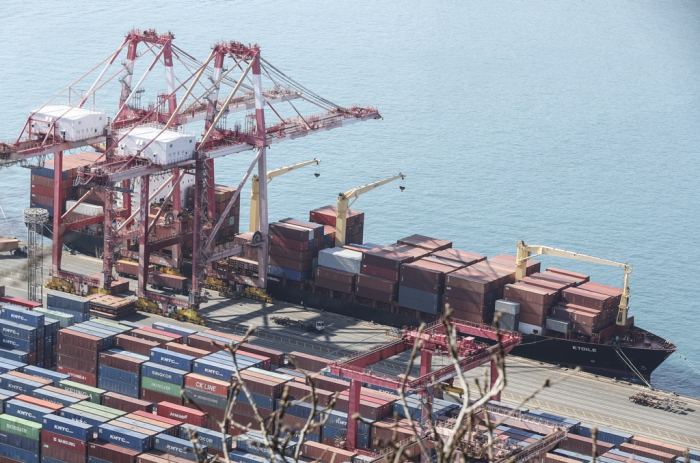War in Ukraine
Korea swings to trade surplus in Feb; Russia risks loom
Jumps in oil prices are expected to raise imports; exports are predicted to ease as Korea joins economic sanctions against Russia
By Mar 02, 2022 (Gmt+09:00)
2
Min read
Most Read
LG Chem to sell water filter business to Glenwood PE for $692 million


Kyobo Life poised to buy Japan’s SBI Group-owned savings bank


KT&G eyes overseas M&A after rejecting activist fund's offer


StockX in merger talks with Naver’s online reseller Kream


Mirae Asset to be named Korea Post’s core real estate fund operator



South Korea logged a trade surplus in February on strong exports after deficits in the previous two months, the recovery remained fragile, given Russia’s invasion of Ukraine.
Asia’s fourth-largest economy reported a trade surplus of $840 million last month, swinging from deficits of revised $4.8 billion in January and $430 million in December 2021, Ministry of Trade, Industry and Energy data showed on Tuesday.
Exports jumped 20.6% to $53.9 billion in February from a year earlier with average daily shipments at a record high of $2.7 billion, according to the data.
Overseas sales of semiconductors increased 24%, while exports of computers and displays reported jumps of 44.5% and 39.2%, respectively. But sales of auto parts to other countries dipped 1.1% as the ongoing automotive chip shortage disrupted productions of global carmakers.
Imports grew 25.1% on-year to $53.1 billion as purchases of oil, gas and coals surged 53.2% to $12.5 billion. But the procurement of the energy resources fell by $3.5 billion from January when demand is usually stronger than February due to the weather conditions.
ECONOMIC SANCTIONS AGAINST RUSSIA
The country’s trade account may turn to a deficit as Russia’s military attack on Ukraine powered energy prices that are expected to drive up import bills of the Asian nation.
The crisis is also predicted to undermine exports. Sales to the Commonwealth of Independent States (CIS) including Russia rose 45.6% in February, indicating the impact of the conflict has yet to be reflected in South Korea’s exports.
The country decided to tighten export controls against Russia by banning sales of strategic items and join Western nations’ moves to block some Russian banks from the SWIFT international payment system.
“The Korean government has strongly condemned Russia's armed invasion against Ukraine. As a responsible member of the international community, the Korean government has decided to actively join the international community’s efforts, including economic sanctions, for a peaceful resolution of the situation,” said the Ministry of Foreign Affairs on Feb. 28.

At the same time, the government was set to carry out steps to minimize the impact of the crisis on exporters, the trade ministry said.
“In order to maintain exports growth in the future, we will try to minimize the impact of external factors such as the Ukraine crisis while intensively implementing export support measures such as easing logistics disruptions, converting customers and providing trade finance in the first half,” said trade minister Moon Sung-wook.
Write to Eui-Jin Jeong at justin@hankyung.com
Jongwoo Cheon edited this article.
More to Read
-
 War in UkrainePerfect storm from Ukraine crisis clouds Korea Inc.’s outlook
War in UkrainePerfect storm from Ukraine crisis clouds Korea Inc.’s outlookFeb 25, 2022 (Gmt+09:00)
4 Min read -
 War in UkraineS.Korea to support firms to offset damage of Ukraine crisis
War in UkraineS.Korea to support firms to offset damage of Ukraine crisisFeb 25, 2022 (Gmt+09:00)
2 Min read -
 EconomyBOK sees inflation at 11-year high as oil tops $100 on Ukraine crisis
EconomyBOK sees inflation at 11-year high as oil tops $100 on Ukraine crisisFeb 24, 2022 (Gmt+09:00)
3 Min read -
 EconomyKorea’s record trade deficit stirs capital outflow fears
EconomyKorea’s record trade deficit stirs capital outflow fearsFeb 03, 2022 (Gmt+09:00)
3 Min read -

-

Comment 0
LOG IN


